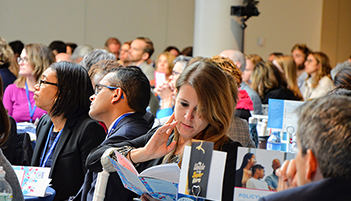HOW CAN WE HELP YOU? Call 1-800-TRY-CHOP
In This Section
On its Tenth Birthday, PolicyLab Gathers Champions for Children
 PolicyLab hosted a 10th anniversary celebration Oct. 22 that its attendees won’t forget. After more than a decade of working to inform policies impacting children’s health, the Center of Emphasis at Children’s Hospital of Philadelphia gathered regional and national leaders alongside clinicians, academics, and community collaborators at the National Museum of American Jewish History in Philadelphia to discuss the future of children’s health policy and practice.
PolicyLab hosted a 10th anniversary celebration Oct. 22 that its attendees won’t forget. After more than a decade of working to inform policies impacting children’s health, the Center of Emphasis at Children’s Hospital of Philadelphia gathered regional and national leaders alongside clinicians, academics, and community collaborators at the National Museum of American Jewish History in Philadelphia to discuss the future of children’s health policy and practice.
As bright minds exchanged ideas and attendees shared their enthusiasm across social media, it was clear that PolicyLab had achieved what co-founders David Rubin, MD, MSCE, and Kathleen Noonan, JD, set out to do from the Center’s start: Go beyond publishing in scientific journals and expedite research to policy leaders and influencers in order to make the biggest impact in our communities.
In her introductory remarks, Noonan spoke about building PolicyLab on the foundation that our approach to research needed to change.
“We spent a lot of time thinking about the failure of so much research that never got to kids,” Noonan said. “And our goal was to figure out how to take the research that told us what would be better for kids, and get it to the market of government officials and nonprofits around the country. The whole model of PolicyLab became collaboration — both inside and outside — and I am just so happy today that this is a conference of academics but also of providers and government partners. It is exactly what we wanted to do.”
A Room Full of Children’s Health Advocates
Thomas Farley, MD, MPH, Philadelphia’s Commissioner of Health, opened the event as PolicyLab’s guest of honor. With his training in pediatrics and vast experience in public health, Dr. Farley lent a valuable perspective on the marriage between evidence-based research and policy development, as well as the importance of collaboration among different groups within the community.
Dr. Farley spoke on the impact of Running Start – Health, an agenda unveiled by Philadelphia Mayor Jim Kenney last year to target the most critical problems in early childhood. Through Running Start, evidence-based programs address adverse outcomes such as sleep-related deaths and delayed early development. Dr. Farley also discussed the Philadelphia Childhood Development Survey, a standardized tool to help policymakers measure how children’s health outcomes are improving.
During lunch, attendees listened to a stimulating discussion about the landscape of federal policymaking for children’s health moderated by Ahaviah Glaser, JD, health policy director at PolicyLab. The dialogue featured Bruce Lesley, president of First Focus and Rodney Whitlock, vice president of Health Policy at ML Strategies, who spoke jointly on the importance of a bipartisan approach to health policy and the detrimental impact that extreme partisan politics can have on decisions about children’s health.
Following the lunchtime plenary, a speech by Madeline Bell, president and CEO of CHOP, emphasized that children are the future. “Why wouldn’t we want to invest in them more than anybody?” Bell asked the audience. “We have a lot of partners in the rooms who can help make the difference for children.”
Throughout the day, attendees participated in breakout sessions on topics such as juvenile justice, the various sources of health inequities, and the importance of helping youth transition to adult care. These panels, which featured key players in public policy and health systems as speakers, illustrated PolicyLab’s modern, dynamic, and discussion-driven approach to the most central issues in children’s health.
Readiness and Resilience in the Family: A National Issue
While the day came packed with rich dialogue and memorable moments, one of the most unique highlights of the forum was the keynote speech delivered by Ms. Stephanie Barna, Under Secretary of Defense for the U.S. Department of Defense (DoD). In 2016, Dr. Rubin was appointed to the DoD’s Military Family Readiness Council, where he continues to share critical research into the unique challenges faced by military families.
After an introduction from Dr. Rubin, Ms. Barna spoke on the three main things that PolicyLab and the DoD have in common. First, both PolicyLab and the DoD share the conviction that family readiness — or the concept that military families and their health must be well-supported — is critical to military readiness. In other words, the strength of our military force is the strength and resilience of their families.
Second, both PolicyLab and the DoD share the belief that family programs must be rooted in practical evidence, which the military calls a “boots on the ground” approach. Evidence-based systematic programs ensure that clinicians and stakeholders provide the highest support to families, improve outcomes, and reduce costs, said Ms. Barna, citing two of the DoD’s programs: the Family Advocacy Program and Military OneSource.
Finally, and perhaps most importantly, Ms. Barna said, both PolicyLab and the DoD share the understanding that “numeric metrics and dollars invested cannot be our only weights.” There must be some consideration of “individual experience, of humanity, and of hope.”
With that thought in mind, Ms. Barna closed her speech with a sentiment that echoed throughout every presentation and panel of the day.
“There remains so much work yet to be done, work on which the future of our communities, our states, and our nation depend,” Ms. Barna said. “But both PolicyLab and the DoD have pledged to respond to the needs of families and children to make them more ready and more resilient for whatever future they choose for themselves. And I believe that all of us bring to this critically important work a mighty heart.”
Image courtesy of Susan Lee